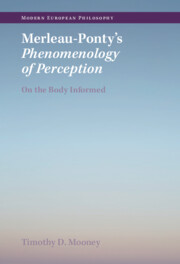Book contents
- Merleau-Ponty’s Phenomenology of Perception
- Modern European Philosophy
- Merleau-Ponty’s Phenomenology of Perception
- Copyright page
- Contents
- Acknowledgements
- Abbreviations
- Preface
- Chapter 1 Phenomenology and Objective Thought
- Chapter 2 Sensations, Associations and Explanations
- Chapter 3 Attention, Judgement and Other Work
- Chapter 4 Back to the Experience of the Body
- Chapter 5 The Body Schema and Our Skills
- Chapter 6 Motor Intentionality and Our Landscapes
- Chapter 7 Others Expressive, Engaged and Exposed
- Chapter 8 Language, Speech and Affectivity
- Chapter 9 Temporality, Subjectivity and Idealisation
- Bibliography
- Index
Chapter 1 - Phenomenology and Objective Thought
Published online by Cambridge University Press: 03 November 2022
- Merleau-Ponty’s Phenomenology of Perception
- Modern European Philosophy
- Merleau-Ponty’s Phenomenology of Perception
- Copyright page
- Contents
- Acknowledgements
- Abbreviations
- Preface
- Chapter 1 Phenomenology and Objective Thought
- Chapter 2 Sensations, Associations and Explanations
- Chapter 3 Attention, Judgement and Other Work
- Chapter 4 Back to the Experience of the Body
- Chapter 5 The Body Schema and Our Skills
- Chapter 6 Motor Intentionality and Our Landscapes
- Chapter 7 Others Expressive, Engaged and Exposed
- Chapter 8 Language, Speech and Affectivity
- Chapter 9 Temporality, Subjectivity and Idealisation
- Bibliography
- Index
Summary
I provide an explication of the content and method of Husserl’s phenomenology, explicating the ideas of bracketing and reduction and of descriptive, eidetic and transcendental phenomenology. In the process I set out his ideas of act intentionality, of co-intending and horizons and of active and passive constitution. I then give an account of how Merleau-Ponty adopts and adapts Husserl’s ideas and methodology, recasting phenomenology as an existential and genetic but nonetheless transcendental enterprise. I go on to outline his account of the scientistic and physicalistic picture of the world presented by what he calls objective thought, his major target from the outset. Against this backdrop, I show that he opposes objective thought because it either reduces consciousness to a physical body in a determined world (as empiricism) or takes it as something that acts from above on a physical and agency-neutral body in a similarly determined world (as intellectualism).
Keywords
- Type
- Chapter
- Information
- Merleau-Ponty's Phenomenology of PerceptionOn the Body Informed, pp. 1 - 30Publisher: Cambridge University PressPrint publication year: 2022



